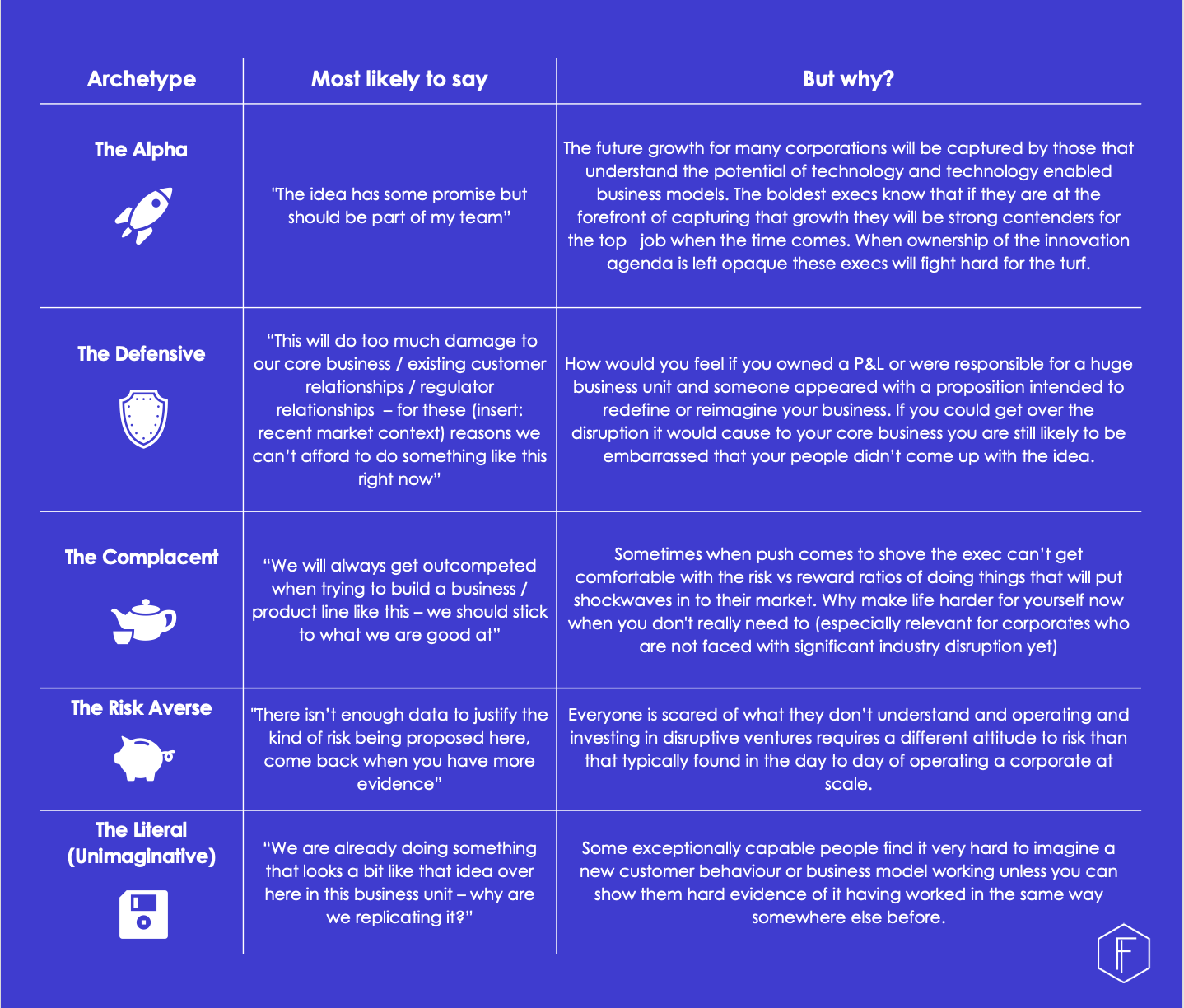The Politics of Innovation
We started Founders Intelligence to help corporate clients benefit from the technology-driven growth in their industry. We believed that the combination of our unique access to what is happening on the front lines of entrepreneurship and brilliant entrepreneurial consultants would be enough to create that growth.
We were wrong.
Our energy in the early days went exclusively into the conception and validation of new ventures or revenue lines through building, partnering or investing. Like any Founder would, we poured over the strategy, product, business model, go to market, partners and team needed to make our clients successful. We learnt very quickly that having the best ideas was only half of the battle, and usually the easier half.
In the corporate context, the structures within which innovation is allowed (or not) to flourish will often define its potential to succeed. Since this early realisation, we have worked hard with our clients to get the team structures, reporting lines, incentives, culture and talent strategies needed to repeatedly deliver high impact growth. A large part of the intellectual property that we have developed at Founders Intelligence is designed to mitigate the most lethal threat to new ideas: Politics.
If you know the corporate innovation game this scene may resonate:
Someone has had a very good idea for an ambitious new venture or revenue line that the corporate they work for has a clear right to win at. They have gotten some very senior execs (maybe even the CEO) excited by it. They have been set up in a safe space to innovate under a CDO, CTO or Head of Strategy. They have built a proof of concept, a small team and perhaps even got their first paying customers. The time has come for them to get a bigger funding round and to fully unlock the corporate assets (e.g. brand, data, customer access) they need for the full launch. They prepare their pitch to go to their board or innovation board, take a deep breath and step into the room, nervous but quietly confident of leaving it with what they need to go to the next stage.
The presentation goes well and there is all round appreciation for how much has been achieved with little time and resource. A number of the exec are effusive, some ask pointed questions and a few stay quiet. After a lot of talk (see example statements below) no decision is made in the room. Smiles, nods and pats are given to the hopeful innovator. When the execs regroup they agree the team has done an exceptional job but should pause for a bit until x happens, or team up with x business unit and crack it together, or prove x with a little more budget before taking the next leap. While there are no explicit blockers, a combination of delays, funding squeezes and a lack of core business support leads to exasperation and the opportunity dies on the vine.
Sometimes exec concerns are legitimate and no is the right answer, but often by the time a concept is at this stage the idea is strong and rigorously validated and there is another thing in play: corporate politics on the part of the exec (taking the oxford dictionary definition — ‘activities aimed at improving someone’s status or increasing power within an organisation’).
Politics are a very normal manifestation of people acting in logical self-interest. The good news is logical self interest is predictable, understanding the motivations is crucial to making the plan you need to navigate the politics. In other words: know your enemy.
In our experience there are a few key exec archetypes that can be used to explain political behaviour:

Sticking to a few core principles will go a long way to managing them:
- Know your enemy: use a framework like this to work out what kind of politics (self-interest) you need to manage
- Do the groundwork: approach innovation with rigour. Its not by mistake that one of the FI values is ‘rigorous in uncertainty’
- Be bold: regularly ask yourself whether your plans and actions are bold enough to meet your stated ambitions
What you can do will depend on where you sit in the organisation, here are a few ideas:

Do the groundwork
Spend time designing a home for ambitious innovation and commit patient capital. Hiring a CDO and leaving them to work their mandate out won’t work.
Hire the right person to lead and don’t assume they need to be external. An existing exec with a vision, a strong internal network and the humility to recognise where their gaps are (so they hire up well) works most consistently.
Know your enemy
If your main board has execs who will always be blockers (usually the Risk-Adverse or Literal archetypes), create an innovation board for big decisions and leave them out. This only works to a point — if it isn’t possible due to your org structure and you really are serious about transforming into a growth focussed organisation, you should ask yourself whether your senior leaders are the right ones.
Be bold
Get involved when politics kick in. It’s okay to have a number of people trying to own the growth story and competition can be healthy, but 2 or 3 times a year you are going to have to give real air cover to protect those leading this change.

Do the groundwork
Prepare your CEO for the politics long before they kick in and tell them what they are going to need to do to help you overcome it.
Take the decision makers on a journey into the mindset of an early stage investor. When the Risk-Adverse archetypes understand the level of data the best venture capitalists use to make investment decisions, and the amount of success and failure they expect, their perspectives on how to invest in early stage corporate ventures will change.
Know your enemy
Work out the supporters you will need to be successful and focus your energy on them. If you do this well, you will be able to minimise the influence of detractors (most likely the Alpha or Defensive archetypes).
Do what you can to make people feel they are missing out if not working with you — some CDOs we know have even been able to get the business to pitch for their help.
Let them take the credit for your successes.
Be bold
Recognise when there are archetypes you won’t be able to win over — usually the Alpha or Unimaginative. You can be fairly sure about who these will be after a year of effort. When you are, do what you can to get them out of any decision making process.
Recognise where your employer is on their innovation journey and act accordingly. If you are the first CDO they have had, you can be pretty sure you are going to break a lot of eggs to get anything done. Make a few important allies and then go for it! Don’t pull any punches. You probably won’t last more than 4 years but you knew that, and you want to have impact, right?
If your employer is more mature in their innovation efforts, you will have space for a diplomatic approach.

Do the groundwork
Be rigorous in your work. You will need more proof of traction than you expect to need to unlock real investment. Be disciplined and relentless in how you develop and test hypotheses, and manage expectations on what you are trying to prove at each phase and how you generate that proof.
Present to your audience, use language the organisation can understand and comfort them with more detail than they nee
Know your enemy
Build bridges with the business. Whether your boss is a diplomat or visionary they are going to need those bridges to get things done. If those bridges are really strong you can often persuade your counter parties to ignore the politics of your bosses and quietly get on with the work to do.
Be Bold
To be successful in your endeavours you are likely going to have to tell those many levels above you that they are wrong in how they view a market or opportunity. Get your facts straight and show them why with the evidence you have generated.
———
Conclusion
In summary, whoever you are, organise as thoroughly for navigating the politics as you have done for the delivery of the work.
Design your innovation structures deliberately to mitigate them. Warn your team to prepare for them.
Categorise your stakeholders using frameworks like those show here and draw up considered campaigns for influencing the stakeholders you need onside.
When you hit politically motivated walls fight the inclination to throw your hands up in despair and remember that politics are only logical self interest in action. Recognise what type of self-interest it is and act accordingly.
Finally, take heart from the fact that once the blockers have been navigated you will have access to powerful corporate assets to scale your product or business, and once you have your irritations with the challenges of innovating in the corporate context will quickly be replaced by admiration for the power and scale of corporate muscles driving your ventures growth.
At Founders Intelligence, we help major corporations access new growth opportunities by innovating around their business model and consumer propositions.



